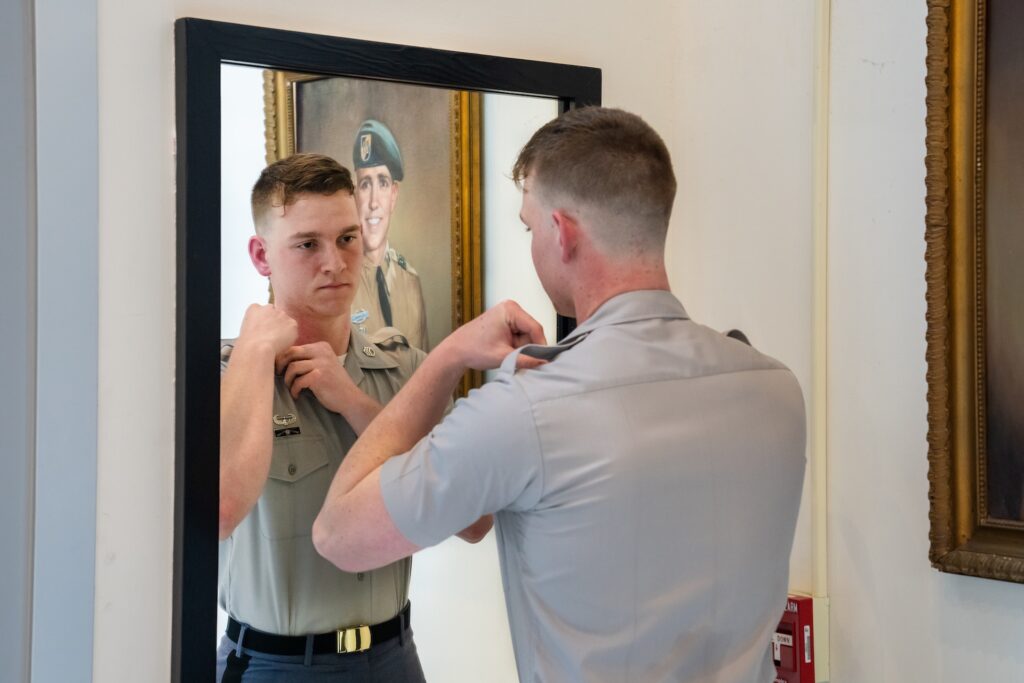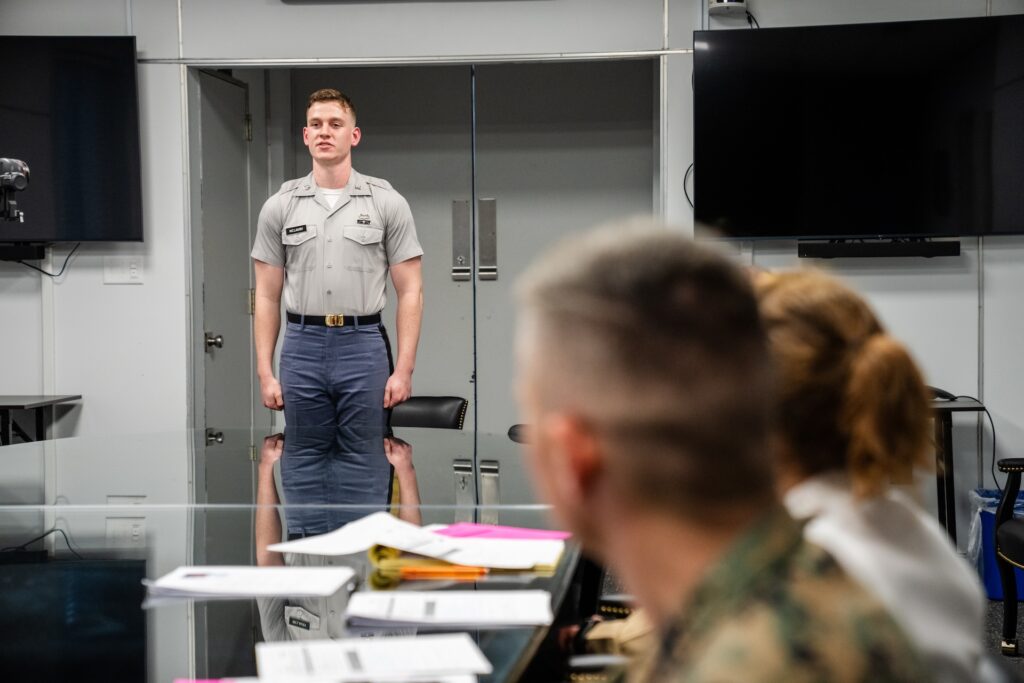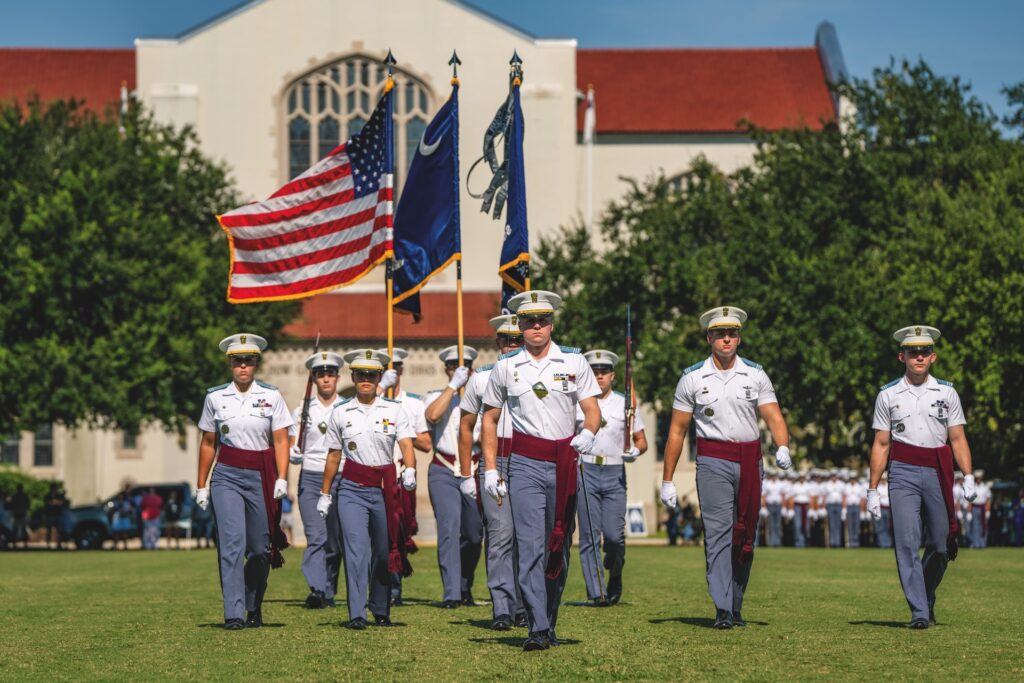In late April, anticipation filled the air in Jenkins Hall Auditorium as sophomore and junior cadets filed into their seats, restless with excitement and nervous energy. A handful of senior rank holders watched from the top row of seats, remembering the rank announcement on this day just a year ago. Suddenly, retired Marine Corps Col. Thomas Gordon, ’91, commandant of cadets, entered the room, and everyone snapped to attention. They were about to find out who would step into the Corps’ top leadership roles—positions responsible for guiding the entire Corps or one of its battalions or companies through the year ahead. The road to this moment in Jenkins Hall was anything but easy—each cadet, already among the best performers in their class, had undergone a rigorous series of interviews and performance reviews to earn the solemn right to lead their peers.
The rank announcement is one of The Citadel’s most anticipated traditions, entrenched in the college’s unique military structure. Cadets live, learn and serve within one of five battalions for all four years on campus. Each battalion is further organized into four or five cadet companies. Each company has three platoons, and each platoon has three squads. Taken together, all five battalions, comprising more than 2,300 cadets, make up the South Carolina Corps of Cadets, overseen by the regimental commander, the top cadet position within the Corps.
Rank is much more than just a title—it is a significant responsibility. Cadets don’t just learn about leadership—they live it every day by carrying out the requirements of their rank and acquiring real-world experience by making decisions that affect the academic, physical fitness, military training and overall success of the Corps. Cadets who take on rank are charged with running the day-to-day administrative and operational duties of the Corps, developing themselves and those in their care into principled leaders, and advising Gordon and his staff.
Like everything at The Citadel, earning rank is a challenge, requiring dedication, determination and excellence. The rank board process begins long before selection interviews take place in the spring of a cadet’s freshman, sophomore and junior years. From the moment freshmen, known as “knobs” during their intense first year, step on campus, they begin building their reputation and credibility. Cadets are judged not only on their academic and physical performance, but also on their integrity and dedication to growth and personal development. The decisions they make every day mark them as ready leaders—or not.
“I think the most valuable lesson I’ve learned has come from making mistakes,” said Lucy McArthur, First Battalion commander. “That’s the beautiful part of the training model at The Citadel—you’re pushed past your limits, you make well-intentioned mistakes, and you grow. Each year prepares you for greater responsibility, so by the time you graduate, you already have experience learning from your challenges.”

The Process
The path to rank begins as soon as the Corps reconstitutes in January each year. Commanders encourage knobs to sit for a rank board interview so they can experience the process firsthand. By February, rising sophomores, juniors and seniors are eligible to apply for rank by filling out a CQR—a Cadet Qualification Report—that records grade point average and physical training score, company participation and extracurricular activities such as athletics or clubs. All of these criteria factor into their overall evaluation.
While freshmen can begin building a work ethic and reputation to lead on their first day on campus, the first real opportunity to lead comes their sophomore year. That’s when cadets may take on positions—such as corporal or clerk—that form the foundation for higher rank.
“Sophomores can be a corporal, which is like a direct leadership position to the knobs,” said Public Affairs NCO Cadet Ciara Bernard. “They can also be a clerk, which is more of an administrative position. Those are the two main roles sophomores can have, and that’s really the foundation if you want to build toward higher rank later on.”
Rising juniors and seniors compete for the top leadership positions, the highest of which is regimental commander, the cadet in charge of leading the entire Corps. Supporting the regimental commander, cadets serve in roles such as regimental staff, battalion commander and company commander.
The rank selection process begins with preliminary company-level interviews, presided over by a TAC officer—an active-duty or retired military officer assigned to a cadet company—and a handful of highly ranked cadets from within their company or battalion. High-performing cadets advance to regimental interviews, where they must demonstrate their potential by excelling across the college’s four pillars: character, academics, military and fitness. Evaluated on a standard rubric, each cadet faces a panel of battalion TAC officers, active-duty colonels, a faculty member, the command sergeant major and the commandant. The importance of the Corps leading the Corps is never out of mind in this process, and the current regimental commander and deputy regimental commander are valued voices in the room, offering advice and reminders about cadets.
“There’s no shortage of qualified candidates,” said Gordon. “It’s an enviable problem. These cadets are so competitive. There’s really no wrong answer with the quality of the applicants. There’s no shortage of talent—we’re just looking for the highest and best qualified.”
From there, cadets are ranked in order of merit based on their scores. The top eight cadets are invited back for a final interview with the commandant, Sgt. Maj. Andrew Yagle, Deputy Commandant Col. Paul O’Leary, and the current regimental commander and deputy regimental commander. These final interviews can last over an hour and are designed to help the commandant make his key selections. Afterward, Gordon names the regimental commander and deputy regimental commander.
“I want to make the process as objective and transparent as possible,” said Gordon. “It’s very much a meritocracy—it’s a highly competitive process. We usually have about 70 individuals who make it to the regimental board to compete for regimental commander and deputy regimental commander, the five battalion commanders and the 21 company commanders.”
In an environment in which every candidate has leadership experience, strong moral character stands out. “I think the most important thing that we look for in the rank board process is credibility with the Corps,” said Gordon. “In the Marine Corps, when you lead, your authority is derived from Title 10 and the Uniform Code of Military Justice. There’s statute, there’s law, there is positional authority. In the Corps of Cadets, their authority to lead is derived from their moral authority, from their credibility. If they don’t have credibility with their peers, they’re not going to be successful.”
Interview questions are designed to assess the character and credibility of competing cadets. “I ask the same questions every year,” said Gordon. “My last question is, ‘If not you, then who?’ It identifies who has credibility among that cohort. It also requires a degree of humility that some struggle with.”
The secret to success is more straightforward than many think. “It’s about being a good cadet, first and foremost, and being a good student,” said Yagle. “Don’t pretend to be something you’re not.”
Cadets who make the most out of the college’s opportunities for hands-on learning gain a leg up. “Get out, get uncomfortable,” said Yagle. “Do things that are going to allow you to grow. We watch for consistency and effort.”
After the commandant and sergeant major choose the regimental commander and deputy regimental commander, battalion and company commanders are chosen in a round-table draft selection by the battalion TAC officers. Gordon, Yagle, the battalion TAC officers and first sergeants meet in the Board of Visitors room in Jenkins Hall, drafting in random order their top picks for cadet leaders within their battalions. Certain cadets with stellar reputations are in demand. Muttered exclamations of disappointment echo around the table when top picks are chosen and taken out of circulation.
After the battalion commanders are selected, the draft moves on to company commanders and first sergeants. “They try to match the leadership style and the personality of the commander with the culture of the company,” said Gordon.
They are drafting the best leaders, but also looking to build cohesive, complementary leadership teams within each battalion. Cadets who are not chosen for these top positions are kept in mind for staff positions and noted as possible replacements if battalion or company commanders lose their rank during the year for disciplinary purposes—an unfortunate occurrence each academic year.
“The commander is not at the top with everyone working for them,” said Immanuel Suhardi, Kilo Company commander. “The pyramid is upside down. I work for the cadets in my company. My job is to support them and help them succeed. Holding rank has taught me about duty and responsibility. I’m proud when people come to me with a problem because it means they trust me to help find a solution.”

In Practice
For those who have been through it, the rank board process is as intense as it is transformative. Former Regimental Commander Sam Wilson, ’25, was on both sides of the 20-foot conference table that serves as the stage for rank board interviews. “One of the big things that I was very blessed to learn from the commandant early on is that the rank board process isn’t about who wants to be the next regimental commander or who wants to be the next battalion commander,” said Wilson. “It’s about who wants to do what the regimental commander actually does. It’s about somebody who wants to do something, not somebody who wants to be someone.”
Wilson stressed that earning the position is about wanting to make a positive impact on the college and the Corps; service is at the heart of leadership. The interview process is intimidating, even for Wilson. “I was really nervous at first—it was a very serious thing for members of the Corps. A lot of people see it as entering the lion’s den.”
For Wilson, returning for a final interview his junior year as one of the top eight candidates was a milestone. Being called in by the commandant for a private congratulations before the Corps-wide announcement was rewarding, but only the tip of the iceberg. “It was exciting,” said Wilson, “but immediately after I learned, I was starting to do the work.”
One of Wilson’s priorities as a leader was allowing others to have a voice. “The Citadel is a leadership laboratory,” said Wilson. “My job was to ensure that we were going towards my vision of what The Citadel could be, but also allowing my peers to make their own leadership decisions.” Wilson made sure to note, however, that any mistakes or failures down the chain belonged to him as well. “You can delegate authority,” said Wilson, “but you can never delegate responsibility.”
Mistakes are inevitable and expected in an environment in which young leaders are testing their mettle, a fact the commandant knows well. “I’m not afraid of well-intentioned failure,” said Gordon. “In fact, I embrace it. I want the Corps to lead the Corps. I will never tell them what to do, but the one mistake that I won’t let them make is the sin of omission—of doing nothing. It requires a tremendous amount of courage to lead. The opposite of courage is not cowardice; the opposite of courage is apathy. It takes courage to care. It takes courage to confront a classmate who’s not doing what they’re supposed to be doing.”
As a senior helping to select the next regimental commander, Wilson kept his focus on leaders who he knew could make difficult choices. “What I looked for was somebody who was willing to make a change and to keep up that communication with others, allowing leaders to lead—to leave the school a better place than you found it.”
Abby Sitarik, ’25, took the same approach in her role as deputy regimental commander. “One of the reasons I wanted to go out for deputy regimental commander is that this role is in charge of the whole fourth- class system,” said Sitarik. The fourth-class system refers to the military training and structure of cadet life at The Citadel, and particularly the training of freshman cadets.
“The most rewarding thing I remember as a knob is going through that system, going to Recognition Day, being able to see it as a corporal, then seeing how it benefited my knobs last year when I was a first sergeant. I wanted to take that to a higher level and make changes as well.”
For Sitarik, cadet leadership opened doors for personal and institutional growth. “Rank here not only gives you an opportunity to push yourself and others, but it also makes this institution better,” said Sitarik. “It was really amazing to see that there’s no limit as to what you can do here.”
“Going out for rank makes you work harder on everything—your uniform, fitness, schoolwork,” said Mason Brierton, Tango Company clerk. “Even if you don’t get it, at least you tried. Being clerk has shown me it’s really a job with real responsibilities, and you can get fired if you’re not on top of things. The biggest lesson I’ve learned is to show genuine care for the knobs while helping them improve.”

Passing the Sword
During this year’s rank announcement—the moment every cadet in Jenkins Hall had been waiting for—David Ropp, ’26, was named the next regimental commander. Now, he is carrying forward the legacy of excellence set by those who came before him. “What I want to focus on this year is the word ‘duty,’” said Ropp. “I want to be able to empower everyone, whether they’re a private or a battalion commander, in their duty.”
For Ropp, leadership opportunities are everywhere; you just have to step up and seize them. “You only get four years at this school, and it is the most unique campus, in my opinion, in the United States, because it gives you so much opportunity,” said Ropp. “Regardless of what position you’re in, you can make an impact on somebody, and while doing that, you’re making an impact on yourself, and that’s what our leadership model is supposed to do. That’s what makes this school so great.”
Reputations are built early at The Citadel. That reputation, combined with years of effort and training, results in leaders who are ready when selected. “Looking at my classmates, especially the battalion commanders and the deputy regimental commander next year, they know the work they’ve put in,” said Ropp. “They’re qualified. They step up to the plate because they know they can.”
On a sunny day in May, Wilson passed Ropp the regimental commander sword during the Long Gray Line Parade, marking the end of Wilson’s tenure as leader of the Corps and the beginning of the next era of cadet leadership. As the rest of the Corps looked on, stalwart in their immaculate rows, the leadership laboratory continued to do what it does best—prepare young men and women for the challenges that will face them in the world beyond Lesesne Gate.
